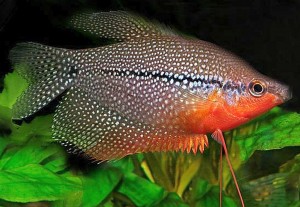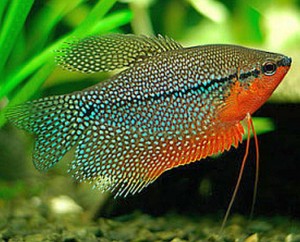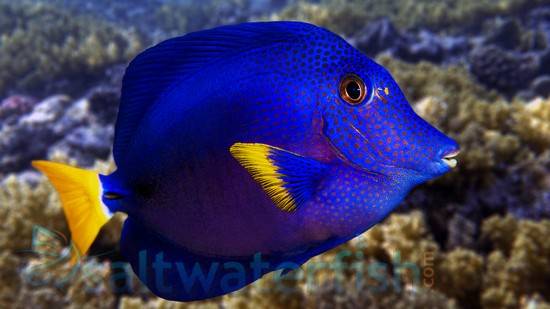Pearl Gourami (Trichogaster leeri) are also known to tropical fish keeping enthusiasts as the Leeri Gourami or Lace Gourami, and are native to Thailand, Malaysia, and Indonesia on the islands of Sumatra, and Borneo.
The fish are generally collected in the acidic waters of lowland swamps where they prefer the middle and top levels of the water column.
Pearl Gourami have a laterally compressed body with long, thin ventral fins that look and act as feelers.
They are covered with iridescent pearl and brown flecks that give it a “mother of pearl” appearance. A horizontal black line runs through the length of the body from the lips to the tail where it ends in a spot.
Like most gourami, Pearl Gourami have a labyrinth organ that allows them to breathe air and survive in oxygen depleted waters that would normally kill most other species which is why they need access to the surface of the tank.
Males have more pointed dorsal and anal fins and are colored with more red than the females. Females have a more rounded body shape with rounder dorsal and anal fins.
Pearl Gourami are an ideal community tank fish that can be housed with other peaceful, like sized species or in groups of at least 6 of their own kind. They should never be kept with aggressive species like Cichlids or they will become recluses, lose their beautiful colors, and often refuse food.
Pearl Gourami need at least a 30 gallon densely planted tank with a dark sand or fine gravel substrate, some driftwood or bogwood, plenty of swimming space, and some floating plants
that can be used to diffuse light and provide hiding places for the fish. They do not need a deep tank and do quite well in water that is less than a foot deep.
Pearl Gourami are bubble nest builders that incorporate aquatic vegetation into their nests to bind the bubbles together. To breed Trichogaster leeri, first condition a pair with live or frozen brine shrimp or bloodworms. Drop the water level in the breeding tank down to about 8″ and maintain the water temperature at 82 °F and the pH at 7.0. When ready to spawn, the male will build a bubble nest where spawning takes place.
When the female takes a position under the nest, the male curves his body tightly around her, from underneath. Her body will quiver as she expels a few eggs. The male releases the female, picks up the eggs into his mouth as they are slowly sinking, and then he spits them into the bubble nest. This scenario is repeated several times until spawning is completed.
After spawning, most breeders remove the female from the tank and the male will guard the eggs and fry until they become free swimming, at which time he should also be removed from the tank. The eggs will generally hatch within two days and the fry become free swimming three days later. At this time they can be fed infusoria, liquid fry food or baby brine shrimp until they can accept finely crushed flake food. This usually takes from 7 to 10 days. The older fry can be fed freeze dried pellets.
As soon as the fry are mobile, it is important to place a tight fitting cover over the breeding tank and to keep the temperature at 84 degrees to create and maintain the hot, humid environment needed for the labyrinth organs to develop in the fry. No water movement is necessary but frequent water changes should be made during this stage when infusoria or baby brine shrimp are fed to the young.
Pearl Gourami are omnivores that eat both algae based and meaty foods. In an aquarium environment, they are not picky eaters and will eagerly accept algae based flake foods, live, frozen, and freeze dried mosquito larvae, bloodworms, tubifex, blackworms, and brine shrimp
.
Pearl Gourami are a favorite of tropical fish keeping enthusiasts and are available for purchase when they are 1 1/2″ to 2″ in length.
Minimum Tank Size: 30 gallons
Care Level: Easy
Temperament: Peaceful
Aquarium Hardiness: Hardy
Water Conditions: 75-86° F, KH 5-18, pH 6.5-8.0
Max Size: 4.7″
Color Form: Clear, White
Diet: Omnivore
Compatibility: Excellent community tank fish
Origin: Borneo, Malaysia, Sumatra
Family: Belontiidae
Lifespan: 5-8 years
Aquarist Experience Level: Easy




